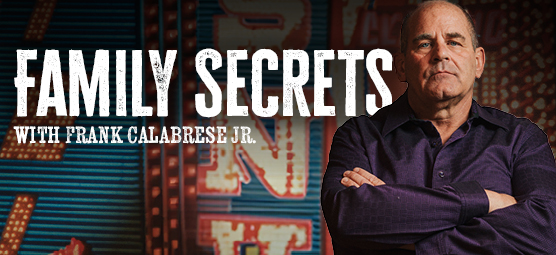
Nora Ephron said his story was Shakespearean and wanted to turn it into a movie. Sadly, she died before she was able to do it.
But Frank Calabrese Jr. says others are now at work in Hollywood trying to put it together. It’s the story of a gangster son turning against his gangster father, a story of love and hate, fear and power, admiration and deceit. Shakespeare would have loved it.
Calabrese said his dad had “three personalities.” He was a loving father, a master criminal and a sociopathic killer who “started to enjoy” the act of homicide and who once pulled a gun on his own son.
‘I thought about my wife and two kids,” Calabrese said while describing how he talked his father down from a homicidal high. From that point on, he was determined to get away from his father and life in the underworld.
Calabrese, 63, has been telling that story and many others four or five times a day, three or four days a week at the Mob Museum in Las Vegas where he is – for want of a better description – “in residence.” It’s quite a gig and it says as much about the vision and mission of the fascinating museum as it does about the erstwhile Chicago gangster who ended up testifying against his father and several others in a case aptly dubbed by the FBI as “Operation Family Secrets.” Calabrese has co-authored a book using the same title.
“It was the hardest thing I did in my life…go against my own dad,” Calabrese said one afternoon as dozens of tourists, taking a respite from the gaming tables and slot machines on Fremont Street just two blocks away, soaked it all in. “I was gonna be just like my dad.”
His dad, Frank Calabrese Sr., was a made member of the Chicago Outfit. A major earner and an accomplished hitman, he was grooming his son to follow in his footsteps. They had a $300,000 bookmaking operation. Adult bookstores that were generating $25,000 a week. And a $1 million loansharking operation, “juice loans” on the street at 10 percent interest.
It was a life built around money, murder and mayhem and, in that respect, Calabrese’s tell-all is not unlike dozens of other stories of gangsters who have cooperated.
Movies, books, reality TV shows and podcasts have turned omerta on its head. The American Mafia, hardly the underworld powerhouse it once was, is now a brand, a marketing tool, a piece of pop culture.
Calabrese and the Mob Museum have tapped into that big time.
The Museum, the brainchild of former Las Vegas mayor and one-time prominent mob defense attorney Oscar Goodman, is housed in the old federal post office/courthouse building in downtown Vegas, far from the posh mega casino hotels on the Strip, but in the shadow of the glitz and glitter, the honky-tonk and seediness that is the “Fremont Street experience.” If you’ve never been to Fremont Street, think of the Wildwood Boardwalk…on steroids.
Modern-day Las Vegas, it could be argued, was built by the mob (with a big assist from the Teamsters Central States Pension Fund). And in that regard, there is no better location for a museum that presents the history of organized crime in America.
Officially known as the National Museum of Organized Crime and Law Enforcement, it opened on February 14, 2012, not coincidentally, the eighty-third anniversary of the infamous St. Valentine’s Day massacre in Chicago. A piece of the blood-stained brick wall spray painted by Capone gunmen who killed seven rival Irish mobsters that day is one of the many “artifacts” on display.
Thompson submachine guns, handcuffs, vintage photos, pieces of evidence from infamous mob investigations….and Bugsy Siegel’s sunglasses. It’s all there. The three-story building includes the old courtroom where, in 1951, U.S. Senator Estes Kefauver held one of the dozens of hearings he staged around the country, hearings that literally brought the American Mafia into everyone’s living room.
Television, the new medium of the 1950s, was in its infancy and the hearings provided a taste of reality TV that seventy-five years later still resonates with viewers. The museum building (and the “Speak Easy” bar and restaurant in the basement) is a trip back in time, a Cooperstown for mob aficionados.
That history is not lost on Frank Calabrese Jr. whose mob bloodlines run deep. His Irish grandfather on his mother’s side, he said, was a player in the underworld during the Capone era and his family also had ties to Ed Hanley who once headed the mob-controlled Hotel and Restaurant Workers union.
Both his father and his uncle Nick Calabrese were made members and accomplished hitmen for the Chicago Outfit. His uncle Nick eventually opted to testify for the feds, joining his nephew in the Operation Family Secrets case. The seven-year investigation focused on 18 mob murders between 1970 and 1986, including the hit on Anthony “Tony the Ant” Spilotro that was recreated (and relocated) in the movie “Casino.” Frank Calabrese Sr. and 13 others were charged in the case that ended with guilty pleas and convictions across the board.
Frank Calabrese Jr.’s testimony was crucial to the investigation and prosecution. So were a series of secretly recorded conversations he had with his father while both were serving time together on unrelated racketeering charges in the late 1990s. It was while in prison that he realized he had to change his life, beat the addictions that had plagued him and get away from his father who was the most dangerous addiction of all. He contacted the FBI and secretly wore a body wire while in prison, a move that put his life in jeopardy every day.
But he was willing to take that chance.
“I look at my time in prison as a way out of this life,” he said, pointing out that when he decided to cooperate his then prison term was nearly up. He cut his deal, he said, not to get a reduced sentence but to get away from his father.
Frank Calabrese Sr., convicted in 2007 in the Secrets case, died in prison in 2012.
His son still mourns his passing, and what life in the underworld did to both of them.
“This life took his heart, took his soul,” Frank Calabrese Jr. said.
That’s a part of the story that is not seen in the artifacts, exhibits and evidence on display in the museum but is fundamental to the story that Frank Calabrese Jr. tells each day.
Back in January, he spoke at the museum along with retired FBI agent Michael Maseth who steered the Family Secrets investigation. Maseth described the case as “a saga of betrayal, redemption, and relentless justice-seeking.”
Nora Ephron had it right.
It’s Shakespeare’s kind of story.

